Many thanks to everyone who filled out our recent Tripawd Cat Quality of Life Survey! Although we hoped to receive more than 20 responses from feline members, we are super grateful for the pet parents who did take time to tell us how they feel about life on three legs. Our surveys are one of the best resources to find out how pets cope as amputees, so thank you everypawdy!
Section 1: The 2024 Tripawd Cat Quality of Life Survey Facts and Figures
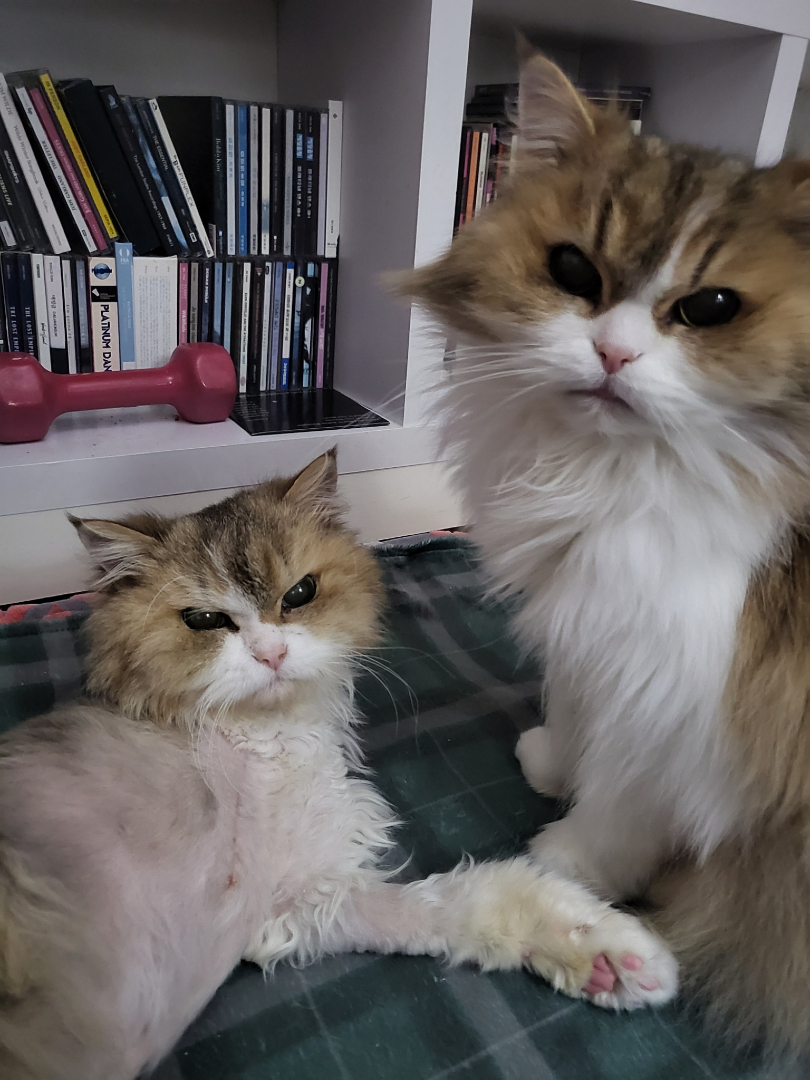
This is the first of three Tripawds Quality of Life Survey results we will share in the coming weeks.
No, it’s not exactly scientific but it’s a good snapshot of life on three legs. We do have a ton of good data from all of our answers so if you know any data geeks who would like to turn these results into a more insightful report, just let us know here.
Meanwhile, here’s an overview of the survey results we received from 20 Tripawd cat parents from all parts of the globe.
- About sixty-five percent of survey respondents reported having a hind leg amputee.
Were you initially opposed to amputation?
Interestingly, the majority of Tripawd cat parents said they were not opposed to amputation for their cat. Some people had previous experience with limb loss, some didn’t but the vast majority wanted to help their cat feel better by doing what needed to be done for their health.
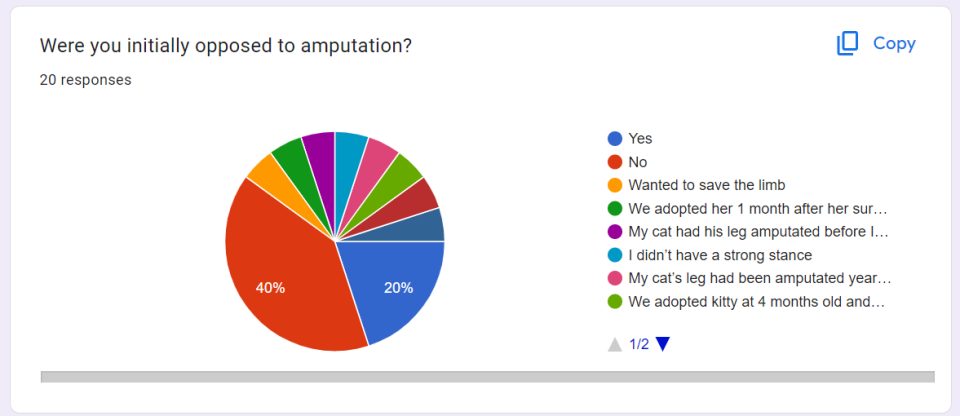
Once I saw videos of how well Tripawd cats could move around and better visualize that they could still play, explore, and do most things they could previously, I was reassured that my cat could still have a fruitful life and not be held post amputation. Especially since amputation provided the best option for containing the cancer.
How old was your cat at the time of amputation?
Apparently, a large number of cats lose a leg before they reach one year old. But senior Tripawd cats over ten years old are well-represented too!
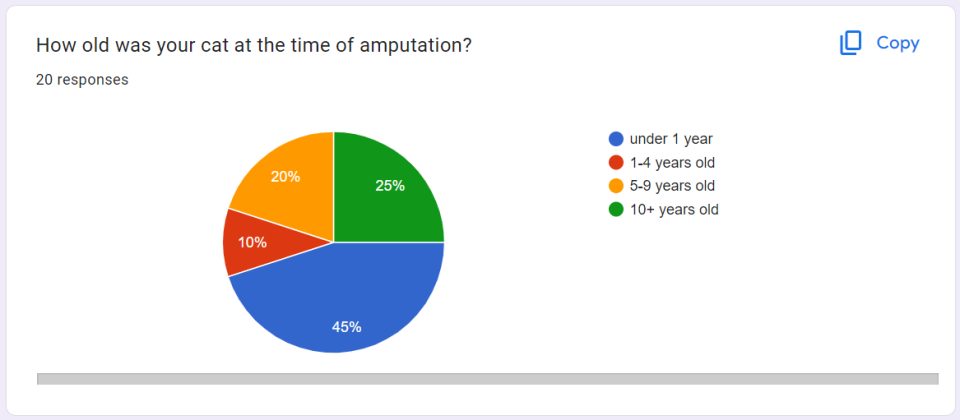
The Amputation Pain Management Experience of Tripawd Cats
Interestingly, when it comes to pain medication for a cat’s amputation, it seems the majority of cats in our survey might not have received enough of pain control. Everyone reported their cats got some form of pain medication after amputation surgery. But not all of them reported receiving the most basic three medications for a good recovery, including:
- Buprenorphine (58%)
- Gabapentin (47%)
- NSAID such as Meloxicam (26%)
Interestingly, over 50% of survey respondents said their cat’s pain management worked out great!
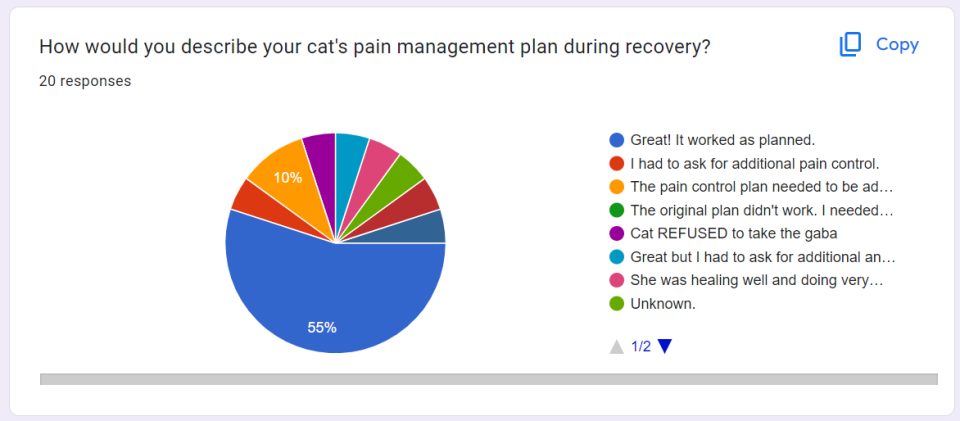
What Kind of Surgeon Did You Choose for Amputation on Your Cat?
When trying to decide on amputation surgery for their cat, many people wonder if they should stick with their family veterinarian, or choose a specialist. Here’s what the 2024 Tripawd Cat Survey respondents did:
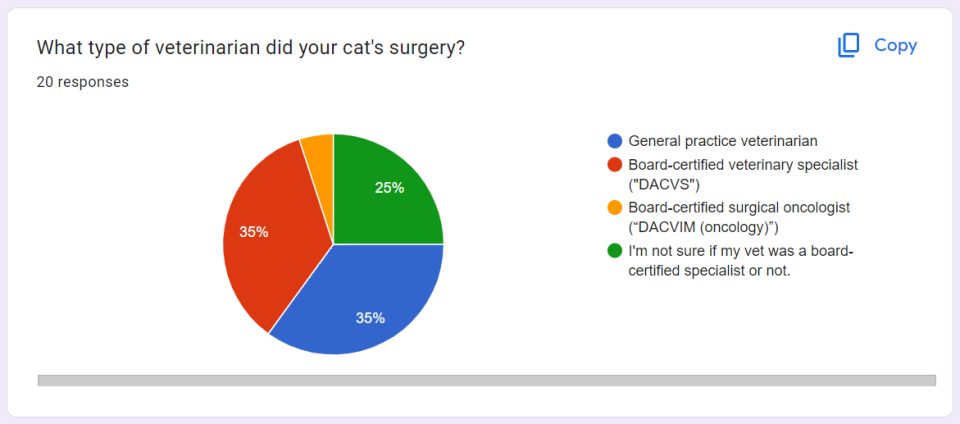
When asked if they specifically chose a hospital accredited by the American Animal Hospital Association (AAHA), 50% of responses said yes!
How would you describe your cat’s adaptation to amputation?
Here’s where we get into the real details about feline life on three legs. Pet parents gave really thoughtful answers in this section. For this first question, 85% of respondents said their cat did great after surgery.
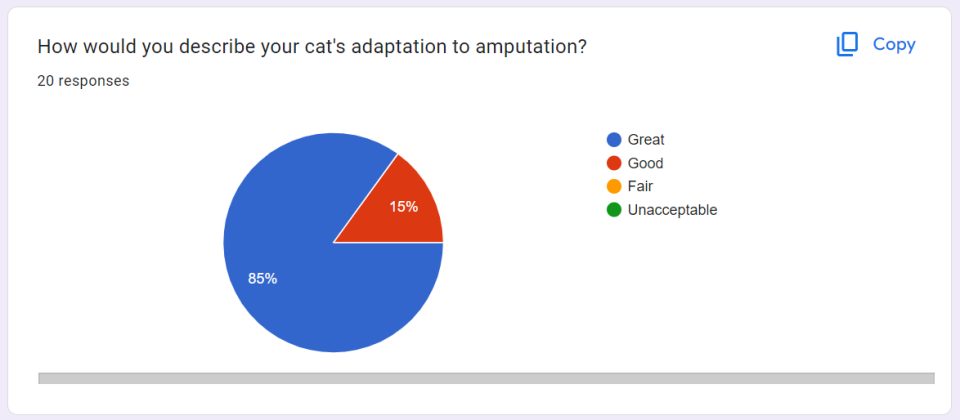
Approximately how long did it take for your cat to adapt to limb loss?
If you don’t know anything about amputation surgery recovery for cats, it’s hard to imagine what recovery time might look like. Well, if that’s you, you will be reassured to know that nearly 50% of survey participants say it only took one or two weeks for their Tripawd cat’s recovery to end.
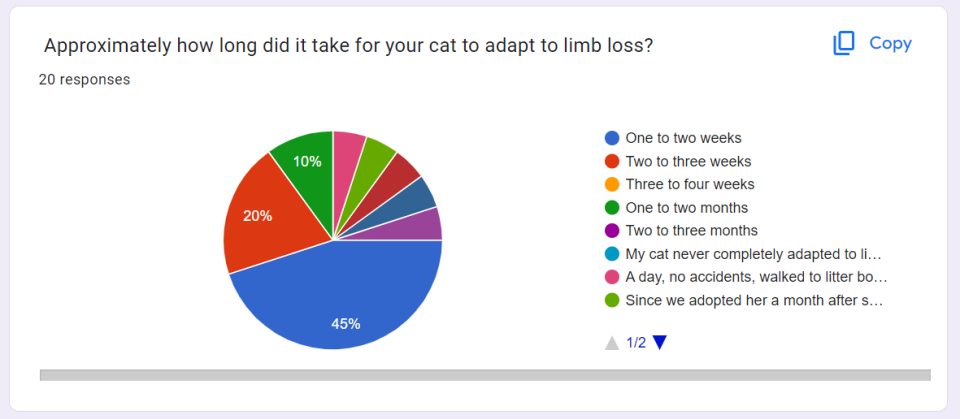
Most (45%) also said they thought the recovery time was about what they expected.
What types of mobility challenges did your cat have after amputation?
It’s normal to wonder if your cat will always need help after limb loss. Here’s how the Tripawds community describes their cat’s physical challenges living life on three legs.
- “A few years later some trouble with using litter box and arthritis in remaining hind leg.”
- “During recovery he had issues walking and using the litter box”
- “Can’t do fast turns, defaults to a sitting position, and can’t jump easily.”
- “Can’t jump as high, needs intermediary steps but really pleased that it didn’t severely impact mobility”
- “Honestly almost none, she can’t jump too high but she is amazing otherwise. Fastest cat in the house.”
Did your cat have any changes in behavior after limb loss?
Will a cat behave differently after amputation surgery? Do any develop odd behaviors? Let’s see what the community says:
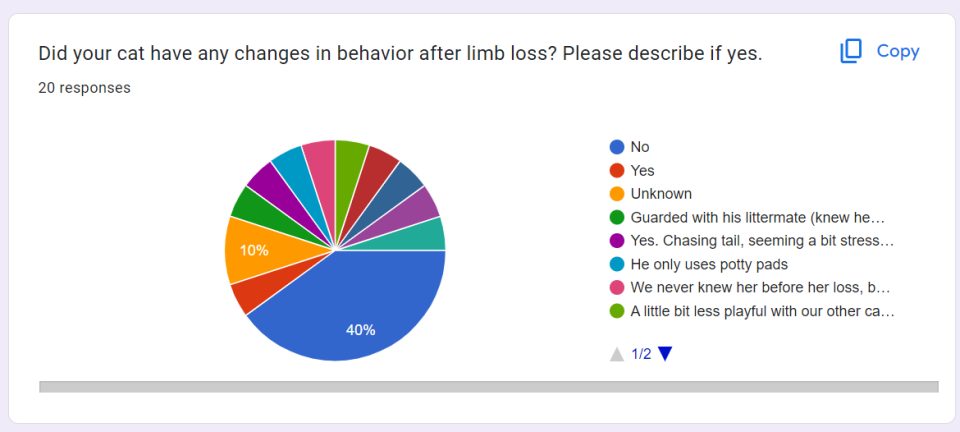
Section 2: In Their Words; Would You Do It Again?
Some of the most enlightening wisdom happened in the next two areas of the survey. When asked “Knowing what you now know, if given the choice again today, would you do the amputation again? Why or why not?” the answer was an overwhelming “Yes!” Not a single cat parent said they wouldn’t do it again. Comments included:
If circumstances required, yes, would go through with it again. I admit it was not easy, but it’s been two years and she’s still going and seems to have yet more time in her. I probably wouldn’t have her now if I hadn’t and she may have suffered more if I hadn’t.
Absolutely. My cat is the happiest, friendliest creature and I can’t imagine him being any different with four legs. He is 15 now, so I am beginning to worry about arthritis in his one back leg. But his amputation as a kitten has not impacted his ability to live a normal, active, (spoiled) long life one bit.
Yes. Absolutely. He seemed close to death from the cancer and miserable. It’s been more than 2 years since amputation and we’ve watched him enjoy life again and gracefully become a senior kitty.
The 2024 Tripawd Cat Quality of Life Results Finale: “What’s Your Best Advice to New Tripawd Cat Parents?“
If you are new here, rest assured you are in good company! The feline Tripawds community understands what you are going through. And in their words, here’s their best advice:
This was a tougher experience for the humans than the cat. It takes time but less time than you think.
The vet sees it every day. It sounds so harsh when they first suggest amputation! Make sure to keep an open mind. It’s a very tough decision, there is no right or wrong choice, do what you feel is best for you and your pet.
Get multiple vet opinions if you are unsure. Question the vet’s experience and qualifications. If the vet doesn’t believe pain meds are needed for more than 3 days……find another vet!!!!
And on a final note, we just want to say thank you to the cat parent who left the following comment about the power of the Tripawds community:
Thank you tripawds.org for what you do. I really didn’t realize how many had similar circumstances. The vet said my cat was old and fat and would struggle to adapt, but she gets around good, won’t say 100%, but she has adapted very well. I taught her to use pet stairs I happened to get from Aldi and she has taught herself a couple adaptions for getting down. You told me stories of overweight cats that made it, you told me stories of older cats making it, you told me stories of other cats with soft tissue sarcoma and I learned we weren’t alone and we could do this.
Stay tuned for pats 2 and 3 of the 2024 Tripawds Quality of Life Survey results, from Tripawd dogs, and pet parents who adopted a three-legged dog or cat!.
Thank you so much to everyone who participated and spent time to provide this helpful, valuable insight about life for amputee dogs and cats. We are furever grateful for your kindness.
I am so thrilled with this website. I am new to this as my current adopted male (approx 2 yo tabby) whom I rescued less than a year ago. He was in recovery when I adopted him and ended up needing another surgery and another 2 weeks separation. I t was rough and I wondered if I had done the right thing. I am thrilled to say that this little fellow is my hero. We saved each other. He is amazing and I am so grateful there is such a Forum as this. God Bless!
Aww thanks Andrea, we are so excited that you and your new kitty are back together! Come and join us in the Forums and tell us all about your sweet Tripawd!